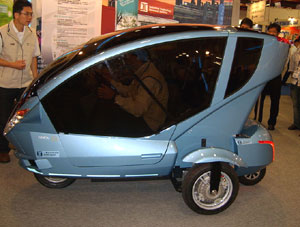
TAIPEI, Taiwan – The island nation of Taiwan is perfectly suited to design and develop small, electric cars for use in urban areas, says James Wang, director, intelligent mobility technology division-Taiwan Automotive Research Consortium.
TARC, a group composed of private and government entities whose mission to promote the Taiwanese auto industry, has developed a concept to demonstrate what it considers as the future of electrically driven urban travel.
On display at the recent AutoTronics Taipei trade show here, TARC’s light-electric vehicle (LEV) concept boasts four wheels – one up front and three in the rear.
Each wheel is powered by its own electric motor, with a sophisticated control system monitoring the torque and speed of each wheel to keep the vehicle stable, Wang says.
The 2-seater LEV is powered by up to four removable lithium-ion batteries, much smaller than those found in larger applications, such as General Motors Corp.’s upcoming Chevrolet Volt extended-range electric vehicle.
Wang declines to reveal the battery supplier but says TARC is working with several Taiwan-based companies.
Although consumers can charge their vehicles at home via a standard electrical outlet, Wang says TARC is working to establish a refueling infrastructure to accommodate the LEV concept and subsequent vehicles.

Wang envisions stations that would provide two ways to charge a vehicle. One would be a quick charge, where the batteries could reach about 80% capacity in about 15 minutes.
The other scenario would be to swap out depleted batteries for charged units in the same way propane tanks are exchanged for the backyard barbecue.
“You could lease the vehicle or the battery,” Wang says.
Depending on how far the driver was planning to travel, one or more battery packs could be swapped out. The LEV concept’s range could reach 62 miles (100 km), with a top speed of about 40 mph (65 km/h), which is the average speed in most urban areas in Taiwan.
Wang says most Taiwanese commute less than nine miles (15 km) a day, far less than in most Western nations. As such, the LEV concept would be an ideal solution for Taiwan and other congested urban areas.
“We’re in a very good position for a small-sized electric vehicle,” Wang says. “We have two unique features in Taiwan. One is the population is very crowded, and urban mobility is very typical behavior in Taiwan. That’s actually a benefit for electric vehicles, because you don’t have to travel long distances.
“And the second one is the warm weather in Taiwan,” he says. “It’s good for batteries, because battery performance typically gets very bad in cold weather.”
Besides Taiwan, the growth of urban centers around the world is accelerating, which strengthens the business case for TARC’s LEV.
“These will mostly be for emerging markets,” Wang says. “I think this will be a unique niche product for Taiwan, and I foresee this type of vehicle becoming more and more popular.
“I think urbanization is a global trend. Over 30% of the population now lives in cities and growing markets in Asia. So I think there’s an advantage or opportunity.
TARC is field-testing its LEV concept in several scenic areas of Taiwan, where tourists can rent them to see the sites, Wang says, adding next year’s testing will be moved to congested areas such as Taipei.



